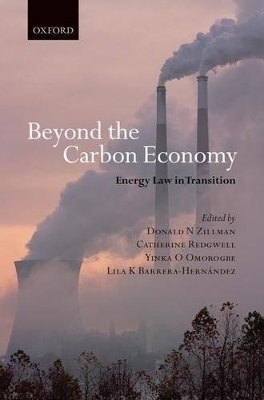
Beyond the Carbon Economy
Energy Law in Transition
Seiten
2008
Oxford University Press (Verlag)
978-0-19-953269-8 (ISBN)
Oxford University Press (Verlag)
978-0-19-953269-8 (ISBN)
Climate change and declining fossil fuel reserves make the current energy economy unsustainable. Rapidly developing nations aspire to the modern energy economy, yet more than half the world's population still lacks access to energy. This volume explores how the law can impede or advance the shift to a significantly different world energy picture.
The present energy economy, with its heavy dependence on fossil fuels, is not sustainable over the medium to long term for many interconnected reasons. Climate change is now recognized as posing a serious threat. Energy and resource decisions involving the carbon fuels therefore play a large role in this threat. Fossil fuel reserves may also be running short and many of the major reserves are in politically unstable parts of the world.
Yet citizens in nations with rapidly developing economies aspire to the benefits of the modern energy economy. China and India alone have 2.4 billion potential customers for cars, industries, and electrical services. Even so, more than half of the world's citizens still lack access to energy. Decisions involving fossil fuels are therefore a significant part of the development equation.
This volume explains how the law can impede or advance the shift to a world energy picture significantly different from that which exists today.
It first examines the factors that create the problems of the present carbon economy, including environmental concerns and development goals. It then provides international and regional legal perspectives, examining public international law, regional legal structures, the responses of international legal bodies, and the role of major international nongovernmental actors. The book then moves on to explore sectoral perspectives including the variety of renewable energy sources, new carbon fuels, nuclear power, demand controls, and energy efficiency. Finally, the authors examine how particular States are, could, or should, be adapting legally to the challenges of moving beyond the carbon economy.
The present energy economy, with its heavy dependence on fossil fuels, is not sustainable over the medium to long term for many interconnected reasons. Climate change is now recognized as posing a serious threat. Energy and resource decisions involving the carbon fuels therefore play a large role in this threat. Fossil fuel reserves may also be running short and many of the major reserves are in politically unstable parts of the world.
Yet citizens in nations with rapidly developing economies aspire to the benefits of the modern energy economy. China and India alone have 2.4 billion potential customers for cars, industries, and electrical services. Even so, more than half of the world's citizens still lack access to energy. Decisions involving fossil fuels are therefore a significant part of the development equation.
This volume explains how the law can impede or advance the shift to a world energy picture significantly different from that which exists today.
It first examines the factors that create the problems of the present carbon economy, including environmental concerns and development goals. It then provides international and regional legal perspectives, examining public international law, regional legal structures, the responses of international legal bodies, and the role of major international nongovernmental actors. The book then moves on to explore sectoral perspectives including the variety of renewable energy sources, new carbon fuels, nuclear power, demand controls, and energy efficiency. Finally, the authors examine how particular States are, could, or should, be adapting legally to the challenges of moving beyond the carbon economy.
Catherine Redgwell is Professor of International Law and Vice-Dean of the Faculty of Laws at University College London. Don Zillman is Godfrey Professor of Law at the University of Maine at Fort Kent. Professor Yinka Omorogbe is Head of the Department of Public and International Law at the University of Ibadan, Nigeria. Lila K. Barrera-Hernández is Adjunct Assistant Professor at the University of Calgary, Canada.
PART 1: SCOPING AND OVERVIEW; PART 2: INTERNATIONAL AND REGIONAL PERSPECTIVES; PART 3: SECTORAL PERSPECTIVES AND TECHNOLOGY-BASED APPROACHES; PART 4: NATIONAL PERSPECTIVES; PART 5: PULLING THE THREADS TOGETHER: AN OVERVIEW OF THE CHALLENGES FOR LAW OF MOVING BEYOND A CARBON ECONOMY
| Erscheint lt. Verlag | 6.3.2008 |
|---|---|
| Verlagsort | Oxford |
| Sprache | englisch |
| Maße | 164 x 242 mm |
| Gewicht | 1046 g |
| Themenwelt | Recht / Steuern ► EU / Internationales Recht |
| Recht / Steuern ► Öffentliches Recht ► Umweltrecht | |
| Technik ► Elektrotechnik / Energietechnik | |
| Technik ► Umwelttechnik / Biotechnologie | |
| Wirtschaft | |
| ISBN-10 | 0-19-953269-9 / 0199532699 |
| ISBN-13 | 978-0-19-953269-8 / 9780199532698 |
| Zustand | Neuware |
| Haben Sie eine Frage zum Produkt? |
Mehr entdecken
aus dem Bereich
aus dem Bereich
wichtige Gesetze und Verordnungen zum Schutz von Umwelt und Klima
Buch | Softcover (2024)
dtv Verlagsgesellschaft
CHF 30,65
mit Verordnungen, Verpackungsgesetz, Elektro- und …
Buch | Softcover (2024)
dtv Verlagsgesellschaft
CHF 27,85


